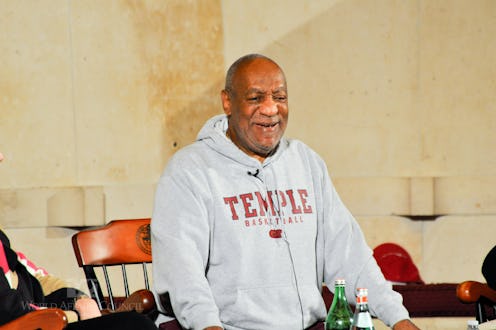Entertainment
Cosby Accusers Tell Their Stories On 'Dateline'

In an emotional and compelling hour, 27 Bill Cosby accusers were interviewed on Dateline on Oct. 9. Throughout the past year, over 50 women have come forward with allegations that Cosby sexually assaulted them, and on the interview's air date, Cosby was deposed by Gloria Allred about the alleged assault of Judith Huth four decades ago when she was just 15 years old. Although the statutes of limitations have expired for the 27 women interviewed (along with the vast majority of Cosby's other accusers), they made clear on Dateline that their motivation for coming forward is to inspire other women to tell their stories. One person who wasn't willing to speak with Dateline was Cosby himself.
The interviewer, Kate Snow, was as tactful as possible as she asked the questions she needed to — and they all sounded excruciatingly familiar to anyone who has ever been involved in a sexual assault case, or followed a news story about a rape accusation or trial. Why didn't any of these 27 women go to police? Why did no one in the room go to the hospital for a rape kit? I understand that these women remain alleged victims because Cosby has never been convicted of rape. But, we need to consider the current statistics of sexual assault cases. According to RAINN, 68 percent of sexual assaults go unreported. And, an even more discouraging statistic is that a mere two percent of rapists will ever spend a day in prison. This data comes from sexual assaults that occurred over the past five years.
Cosby's lawyer issued this statement last November:
Over the last several weeks, decade-old, discredited allegations against Mr. Cosby have resurfaced. The fact that they are being repeated does not make them true. Mr. Cosby does not intend to dignify these allegations with any comment. He would like to thank all his fans for the outpouring of support and assure them that, at age 77, he is doing his best work. There will be no further statement from Mr. Cosby or any of his representatives.
Bustle has reached out to Cosby's legal representatives for comment, but did not hear back at the time of publication.
Although we still have a long way to go when it comes to handling sexual assault allegations, society was in a far worse place when these alleged assaults occurred. They date back to 1970 — and many of the accusers, who viewed Cosby as a mentor, claimed to Snow they'd never even heard the term "date rape." Although some of the interviewees reported telling their agents, bosses, or family members, they claimed they received no support from these authority figures and were told to keep quiet. Although the women answered a resounding "yes" when asked if Cosby's alleged disturbing behavior was common knowledge in Hollywood, they told Snow that agents and bosses allegedly told them that they would not be believed if they came forward publicly.
As they described the aftermath of the alleged incidents, many of the accusers also voiced emotions that far too often go hand in hand with sexual assault — humiliation, shame, and self-blame. Several even claimed they stayed in contact with Cosby and expressed they were in denial about what had happened — especially after they were allegedly invalidated by trusted authority figures, including their own parents.
The group of 27 were understandably emotional, and one thing that stood out to me throughout the interview was the support they offered each other. Many of these women are now involved in activism to lengthen the statutes of limitations in sexual assault cases. They told Snow they don't regret coming forward because they have the opportunity to be of service to the next generation.
For everyone who watched the interview and is following the Cosby case, it's our prerogative to decide who and what we believe. None of the 27 interviewees have filed legal or civil cases against Cosby, but Dateline did the accusers and the audience a great service by giving the women an opportunity to come together and tell their stories. They deserve a platform and they have a right to be heard.
Image via World Affairs Council/Flickr